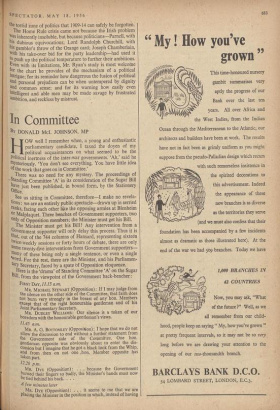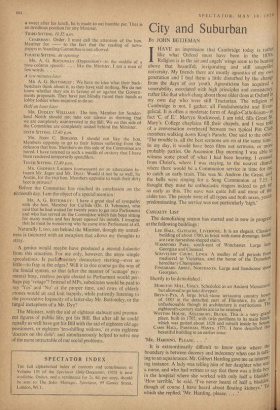In Committee I 3 Y DONALD Mcl. JOHNSON, MP H OW well I
remember when, a young and enthusiastic parliamentary candidate, I taxed the doyen of my political acquaintances on what seemed to be the Political inertness of the inter-war governments. 'Au,' said he inYsteriously. 'You don't see everything. You have little idea of the work that goes on in Committee.' There was no need for any mystery. The proceedings of Standing Committee 'A' in its consideration of the Sugar Bill have just been published, in bound form, by the Stationery Office.
, See us sitting in Committee, therefore—I make no revela- tions: we are an entirely public spectacle—drawn up in serried ranks, facing each other like the opposing armies at Blenheim Or Malplaquet. Three benches of Government supporters, two Only of Opposition members; the Minister must get his Bill. The Minister must get his Bill ! Any intervention from a Government supporter will only delay this process. Thus it is that, out of the 744 columns of Hansard, representing sixteen twice-weekly sessions or forty hours of debate, there are only s°nle twenty-five interventions from Government supporters— ninny of these being only a single sentence, or even a single 'Word. For the rest, there are the Minister, and his Parliamen- tary Secretary, faced by a spate of Opposition eloquence. , Here is the 'drama' of Standing Committee 'A' on the Sugar 'dill, from the viewpoint of the Government back-bencher : FIRST DAY, 11.15 a.m.
MR. MICHAEL STEWART (Opposition): If! may judge from the silence on the other side of the Committee, that faith does not burn very strongly in the breast of any hon. Members except that of the right honourable gentleman and of his Joint Parliamentary Secretary.
MR. DUDLEY WILLIAMS: Our silence is a token of our boredom with the honourable gentleman's views.
11.45 a.m.
Ma. A. G. BoTromi_Ey (Opposition): I hope that we do not allow the discussion to end without a further statement from the Government side of the Committee. One hon. gentleman opposite was obviously about to enter the dis- cussion but I imagine that he got a black look from the Whip, and from then on not one ,hon. Member opposite has
taken part.
12.20 p.m.
M. Dye (Opposition): . . . because the Government burned their fingers so badly, the Minister's hands must now be tied behind his back. . • •
A few minutes later
Ma. DYE (Opposition): . . . it seems to me that we are Placing the Minister in the position in which, instead of having
a sweet after his lunch, he is made to eat humble pie. That is an invidious position for any Minister.
THIRD SITTING. 10.35 a.m.
CHAIRMAN: Order. I must call the attention of the hon. Member for — .to the fact that the reading of news- papers in Standing Committee is not allowed.
FOURTH SM'ING. At opening
MR. A. C.1. Borrorouiv (Opposition)—in the middle of a nine-column speedi : . . . like the Minister, 1 am a man of few words. . . .
A few minutes later MR. A. G. BO1TOMLEY : We have no idea what their back- benchers think about it, as they have said nothing. We do not know whether they are in favour of or against the Govern- ments proposals. They have just blindly raised their hands as lobby fodder when required to do so.
Half an hour later
M. DUDLEY WILLIAMS: The hon. Member for Sunder- land North should not take our silence as showing that we are completely uninterested in the Bill. We on this side of the Committee are completely united behind the Minister.
SIXTH SITTING. 12.40 p.m.
M. JOHN C. BIDGOOD. I should not like the hon. Members opposite to go to their homes suffering from the delusion that hon. Members on this side of the Committee are bored. I have listened to such a wealth of oratory that 1 have been rendered temporarily speechless.
TENTH SI1TING. /2.40 p.m.
M. GODFREY LAUDEN (consequent on an altercation be • tween Mr. Jeger and Mr. Dye): Would it not be as well, Sir Austin, for the two hon. Members opposite to wash their dirty beet in private?
Before the Committee has reached its conclusion on the sixteenth day, I am the object of a special mention : MR. A. G. Borromuy: I have a great deal of. sympathy with the hon. Member for Carlisle (Dr. D. 'Johnson), who said that he had waited for twenty years to get into Parliament and who has served on the Corn rnjttee which has been sitting for many weeks and has never opened his mouth. I imagine that he must be wondering why he came into Parliament at all.
Naturally 1, too, am behind the Minister, though my united- ness is tinctured with an escapism that allows my thoughts to stray.
A genius would maybe have produced a second lolanthe from this situation. For me only, however, the more simple speculations. Is parliatnentary democracy starting—ever so little—to fray at the edges? Will it in due course go the way of the feudal system, so that (after.the manner Of `scutage' pay- ments) busy, restless people elected to Parliament would per- haps pay `votage'? Instead of.MPs, substitutes would be paid to say 'Yes' and `No' at the proper time, and rows of elderly crones would sit and knit happily, while patiently listening to the provocative loquacity of a latter-day Mr. Bottomley, or the turgid metaphors of a Mr. Dye?
The Minister, with the aid of eighteen stalwart and promin- ent figures of public life, got his Bill. But after all he could equally as well have got his Bill with the aid of eighteen old age pensioners, or eighteen 'ten-shilling widows,' or even eighteen 'doctors on the dole'; and simultaneously helped to solve one of the more intractable of our social problems.



































 Previous page
Previous page